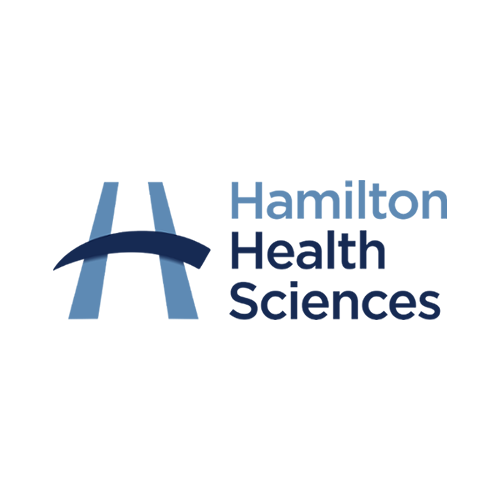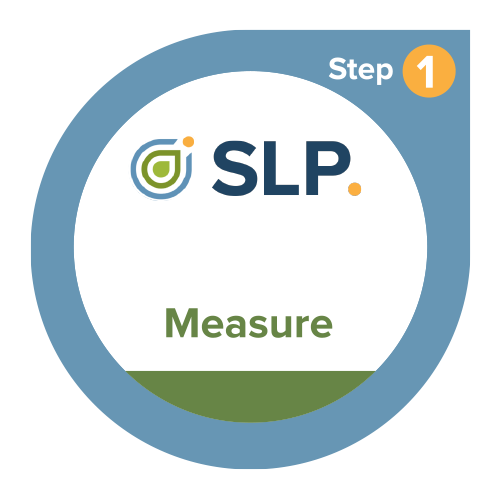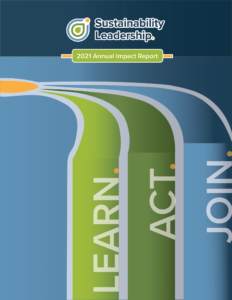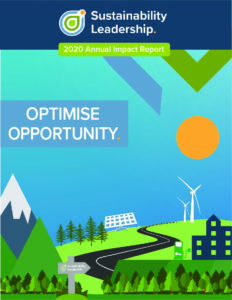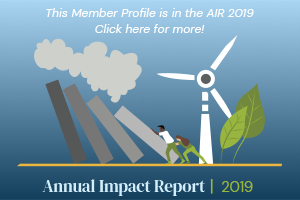Hamilton Health Sciences
Member Profile.
Member Profile
Hamilton Health Sciences is the largest employer in the Greater Hamilton region. We became a member of Sustainability Leadership in September of 2017 and continue to report through the Sustainable Business Initiative annually. In 2016, HHS had set a goal of 20% reduction in GHG emissions by 2020. Since then, we have made significant upgrades and changes to our operational strategy and in 2022 we are proudly reporting an emissions reduction of 48%. Since 2016, we have also introduced new and novel waste diversion programs such as PVC recycling, PPE diversion and increased medical device reprocessing. From recycling to native species tree planting, HHS remains committed to our environmental performance.
Sustainability Leadership Program Updates
Annual Impact Report 2022
This report highlights the actions and performances of the 2022 calendar year while using 2016 as our baseline-reporting year. Key Highlights from the report:
– 47.52% emissions reduction since 2016, due to significant equipment upgrades and changes to operational strategy of our cogenerators
– Virtual Visits Program – 226 tCo2e avoided in month of May alone
– 30.6% reduction in water use since 2016
– Continuation of Mask Diversion program, diverting 873, 729 masks (9.27% of all masks) in 2022
– 40.1% overall waste diverted from landfill
– Continuation of PVC 123 program, diverting 1.28 MT from landfill
– Digitization of paper patient charts, leading to 39.MT less paper used in 2022 and 16.48% less cost than 2021
– Refresh of Single-Use Device Reprocessing program, contributing to 0.377 MT of devices diverted from landfill
– Launch of new and more robust EDI Program
– Installation of 1 new water fill station
– Additional pollinator planting of 90 shrubs/flowers and 10 trees

Annual Impact Report 2021
Our annual report began including the RJCHC as well as scope 3 – purchased water. We also made adjustments to the 2021 and prior year data to include scope 2 – purchased district heating and cooling. We re-engaged our staff in a materiality survey, updating our 2017 survey results and adding some qualitative questions.
We completed 3 initiatives to lower our electricity usage by replacing 276 (high-intensity discharge) lights with LEDs, installed VFDs (variable frequency drive) on AHU (air handling Units) to allow for ramping down of fans during low occupancy periods, and re-lamped 2000 fluorescent fixtures with LED lamps, for a total emissions savings of just over 450 tCO2e.
We are currently in the process of replacing our 13 obsolete generators with cleaner and more fuel-efficient units that meet the latest emission standards. Slated for completion in 2022, this project will help us to reduce natural gas consumption and greenhouse gas emissions. By 2023, we plan to run these generator sets for only 1,000 hours per year. The estimated CO2 reduction at the three sites is 30,000 tonnes annually, considering lower run time. This represents an approximate 50% reduction in CO2 emissions, getting us halfway to net-zero emissions within 4 years’ time.
Additionally, we are hoping to further expand some of our recycling programs!
Annual Impact Report 2020
Energy & Emissions: In 2020, HHS replaced over 2,200 tubes with LEDs and insulated enough pipes to reduce emissions by 2969 tCO2e
Waste: HHS diverted 41.3% of all waste from landfill, which is 3.3% above our peer hospitals. Highlights include:
› 170 metric tonnes of food waste diverted from landfill
› 1520 metric tonnes of recycling
› 586 MT less waste than in 2019
Other: HHS planted 10 more native species trees
Social: Created a dynamic and multi-faceted Covid-19 mental health resiliency program to support our staff struggling with the pressures of the pandemic

Annual Impact Report 2019
In 2019, our Sustainability Report uses the new GRI Standards framework, having updated our format from GRI G4 in 2018 and using the resources provided by SHB. The 2019 report discusses the challenges and opportunities that we face as we strive for excellent performance in the areas that are most important to our stakeholders. While this version of the report will remain for internal use only and circulated to SHB, highlights from the 2019 Sustainability Report will be integrated into the larger HHS public Community Report set to be published mid to late 2020.
Compared to our 2016 baseline, in 2019 HHS has reduced greenhouse gas emissions by over 10,000 tonnes. These reductions have been achieved through a number of energy efficiency projects including LED re-lamping, air handling unit damper optimization, and installing occupancy detection technology. The greatest GHG reductions have been observed at McMaster University Medical Centre which would be attributed to changing production patterns at our cogeneration facility. Our goal is to sustain this reduction over time and against external factors such as weather.


2019 Profile
Hamilton Health Sciences is the largest employer in the Greater Hamilton region. We onboarded with Sustainable Hamilton Burlington in September of 2017 and continue to report through the Sustainable Business Initiative annually.
Prior to onboarding with SHB, HHS had set a goal of a 20% reduction in GHG emissions by 2020 with a baseline set in 2016 (as per MOECP requirements). Since becoming SHB members some Environmental Leads at HHS have been trained in GRI sustainability reporting, we have conducted a materiality assessment, and we have benefited from SHB events and workshops.
Annual Business Report 2018-2019
In 2018, we expanded the scope of our GRI report to include social indicators, engaging a number of HR portfolio managers and Vice President into the reporting process. Looking forward into 2019, Hamilton Health Sciences (HHS) is gearing up our communications and engagement plan about our corporate environmental sustainability efforts as well as enhancing our existing education modules to include more robust education. With the continued support of SHB, we plan to widen the breadth of corporate sustainability knowledge here at HHS, and begin to include leaders and front line staff into the SHB education events.
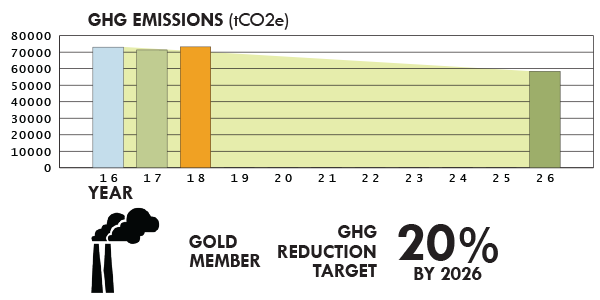
2018-2019 Profile
Prior to onboarding with SHB, HHS had set a goal of a 20% reduction in emissions by 2020 with a baseline set in 2016 (as per MOECC requirements). As you can see in the bar graph, we have had success reducing our emissions in 2017, but have seen a slight increase over baseline numbers in 2018.
Since onboarding with SHB in September of 2017, some Environmental Sustainability Leads at HHS have been trained in Verisae, we have conducted a materiality assessment, are finalizing our annual report, and have benefited from a number of events and workshops.


